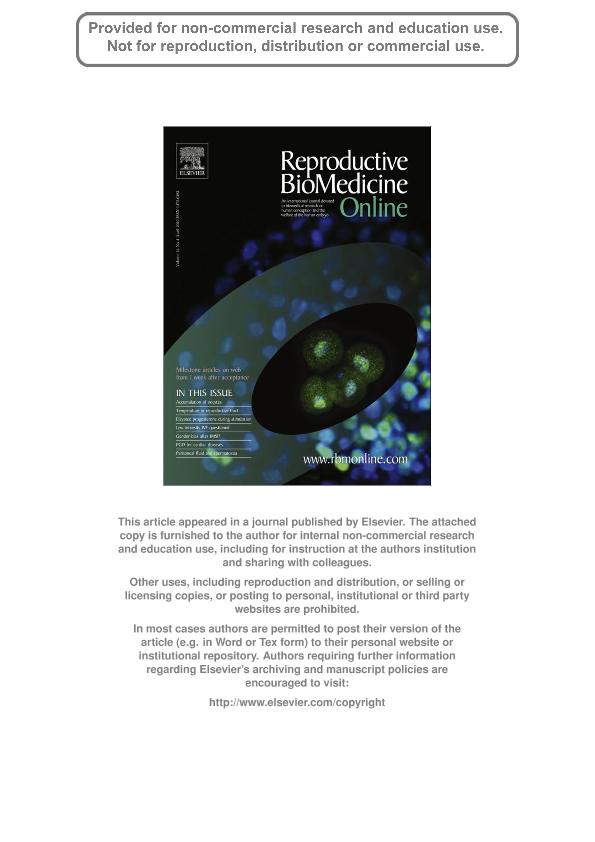Mostrar el registro sencillo del ítem
dc.contributor.author
Caille, Adriana M.
dc.contributor.author
Berta, Cesar L.
dc.contributor.author
Cuasnicu, Patricia Sara

dc.contributor.author
Munuce, María J.
dc.date.available
2016-12-20T20:16:25Z
dc.date.issued
2012-04
dc.identifier.citation
Caille, Adriana M.; Berta, Cesar L.; Cuasnicu, Patricia Sara; Munuce, María J. ; Peritoneal fluid modifies the response of human spermatozoa to follicular fluid; Reproductive Healthcare Ltd; Reproductive Biomedicine Online; 24; 4; 4-2012; 466-473
dc.identifier.issn
1472-6483
dc.identifier.uri
http://hdl.handle.net/11336/9854
dc.description.abstract
The aim of this study was to elucidate the mechanism involved in the acrosome reaction (AR) induced by follicular fluid (FF) in spermatozoa previously exposed to peritoneal fluid (PF). The influence of progesterone was also investigated. Semen samples were from 18 normozoospermic donors. PF samples were from 13 women with unexplained infertility and from a woman treated with synthetic progestagen. FF samples were collected from six women undergoing IVF/embryo transfer and pooled. Motile spermatozoa were capacitated overnight and a kinetic and inhibition study on the FF-induced AR was performed. Spermatozoa pretreated with PF were challenged with either FF or progesterone. The ability of progesterone- and progestagen-supplemented PF to induce AR was analysed. Enzyme-digested PF was also tested. Pre-incubation with PF for 60 min completely prevented the FF-induced AR; spermatozoa treated with PF were unable to respond to FF or progesterone and this effect was not reversible. Progesterone- and progestagen-supplemented PF stimulated the AR relative to controls. Enzyme-digested PF did not have an inhibitory capacity. These data strongly suggest that there are one or more inhibitory proteins in PF that interact with spermatozoa so as to prevent access of progesterone to its receptor and thus inhibit the occurrence of the AR. The oviduct, or Fallopian tube, provides a place for spermatozoa and egg transport and storage, fertilization and early embryo development. If ovulation has not occurred, spermatozoa may reside in the oviduct for several hours or even a few days, awaiting oocyte arrival. It is assumed that fluids present in the female genital tract may have a role in synchronizing the timing required to guarantee the success of fertilization. We previously observed that the peritoneal fluid that bathes the peritoneal cavity is a suitable medium for sperm survival and we also reported that this fluid could stabilize spermatozoa. In this study we show further evidence that the exposure to peritoneal fluid modifies the response of spermatozoa to oocyte signals.
dc.format
application/pdf
dc.language.iso
eng
dc.publisher
Reproductive Healthcare Ltd

dc.rights
info:eu-repo/semantics/openAccess
dc.rights.uri
https://creativecommons.org/licenses/by-nc-sa/2.5/ar/
dc.subject
Acrosome Reaction
dc.subject
Capacitation
dc.subject
Follicular Fluid
dc.subject
Human Spermatozoa
dc.subject.classification
Bioquímica y Biología Molecular

dc.subject.classification
Medicina Básica

dc.subject.classification
CIENCIAS MÉDICAS Y DE LA SALUD

dc.title
Peritoneal fluid modifies the response of human spermatozoa to follicular fluid
dc.type
info:eu-repo/semantics/article
dc.type
info:ar-repo/semantics/artículo
dc.type
info:eu-repo/semantics/publishedVersion
dc.date.updated
2016-11-22T21:20:59Z
dc.identifier.eissn
1472-6491
dc.journal.volume
24
dc.journal.number
4
dc.journal.pagination
466-473
dc.journal.pais
Países Bajos

dc.journal.ciudad
Amsterdam
dc.description.fil
Fil: Caille, Adriana M.. Universidad Nacional de Rosario. Facultad de Ciencias Bioquímicas y Farmacéuticas; Argentina
dc.description.fil
Fil: Berta, Cesar L.. Universidad Nacional de Rosario. Facultad de Ciencias Bioquímicas y Farmacéuticas; Argentina
dc.description.fil
Fil: Cuasnicu, Patricia Sara. Consejo Nacional de Investigaciones Científicas y Técnicas. Instituto de Biología y Medicina Experimental (i); Argentina. Universidad Nacional de Rosario. Facultad de Ciencias Bioquímicas y Farmacéuticas; Argentina
dc.description.fil
Fil: Munuce, María J.. Universidad Nacional de Rosario. Facultad de Ciencias Bioquímicas y Farmacéuticas; Argentina
dc.journal.title
Reproductive Biomedicine Online

dc.relation.alternativeid
info:eu-repo/semantics/altIdentifier/url/http://www.rbmojournal.com/article/S1472-6483(12)00012-0/abstract
dc.relation.alternativeid
info:eu-repo/semantics/altIdentifier/doi/http://dx.doi.org/10.1016/j.rbmo.2011.12.010
dc.relation.alternativeid
info:eu-repo/semantics/altIdentifier/url/http://www.sciencedirect.com/science/article/pii/S1472648312000120
Archivos asociados
